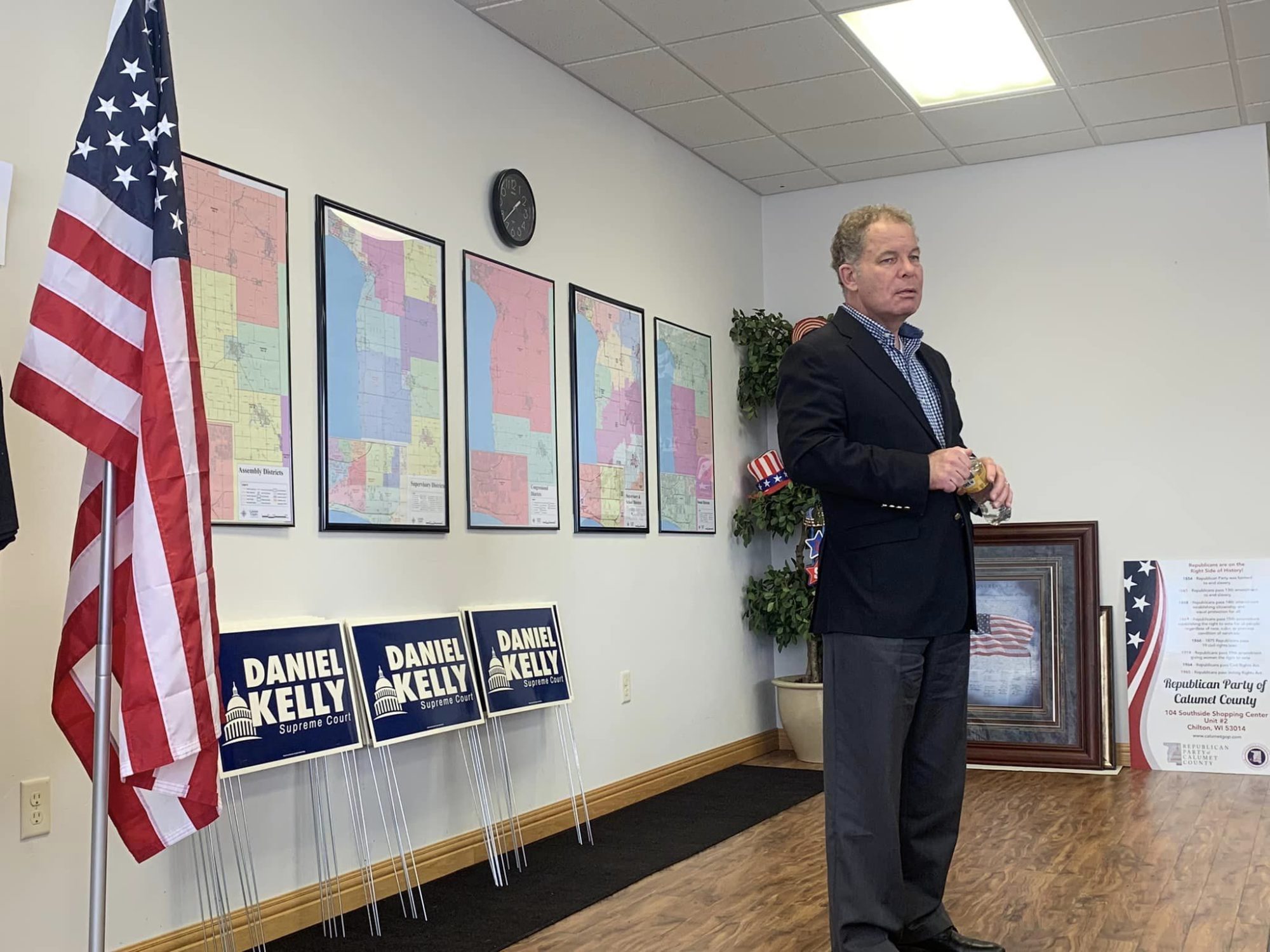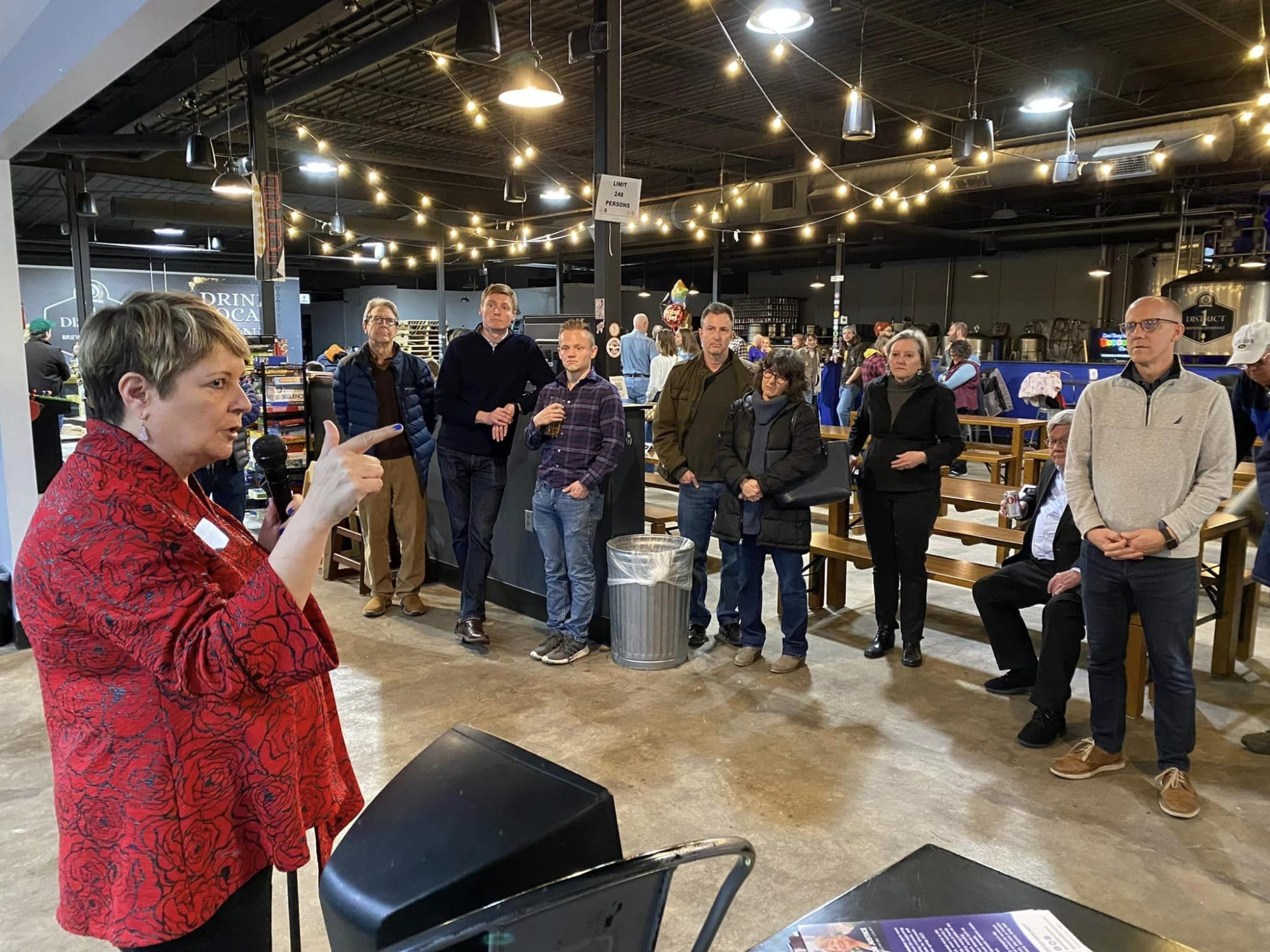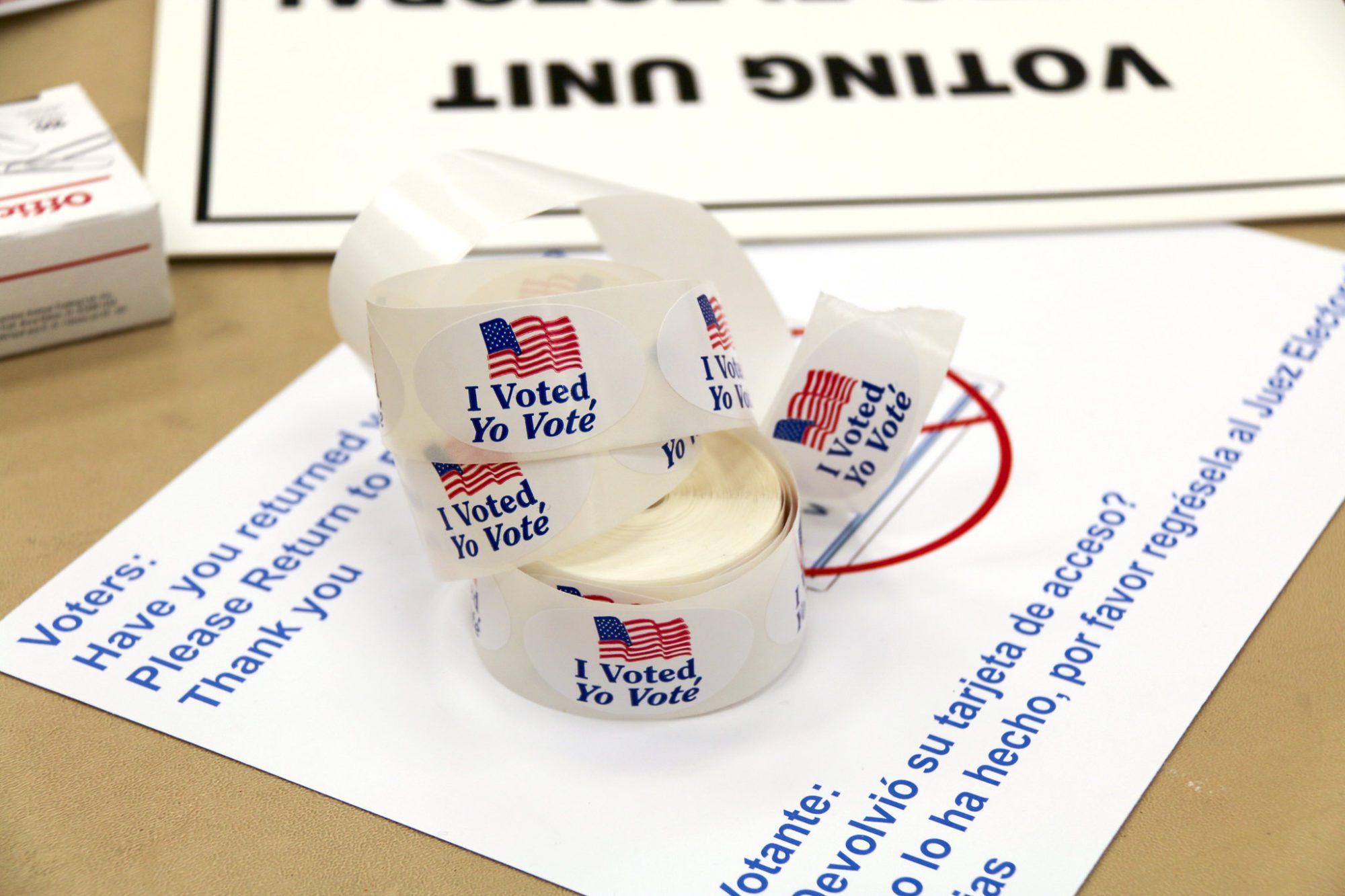Wisconsin’s Supreme Court Runoff Takes Shape as Referendum on Abortion and Democracy
Democrats are eying this spring’s supreme court race as a rare opportunity to crack the Wisconsin GOP’s iron-clad and largely election-proof control on state government.
Daniel Nichanian | February 22, 2023


Wisconsinites on Tuesday set up a high-stakes showdown that will decide the balance of power of their state supreme court. Janet Protasiewicz, a liberal local judge, and Daniel Kelly, a conservative former justice, grabbed the first two spots in a four-candidate primary and moved to the April 4 runoff.
The suspense on Tuesday rested largely on which of the two conservatives would make it to the runoff. Kelly, who finished narrowly ahead of local judge Jennifer Dorow, with 24 to 22 percent, was Democrats’ preferred opponent due to his arch-conservative record, connections to Donald Trump, and re-election loss three years ago, and at least one liberal organization spent heavily in the run-up to the primary to hurt Dorow’s chances.
But Protasiewicz’s dominant showing became a story of its own. She finished with 46.4 percent of the vote, more than the two conservatives combined, with another liberal-aligned candidate, Everett Mitchell, coming in a distant fourth. Overall, the two liberals combined for 54 percent of the vote, with 46 percent going to the two conservatives. Judicial elections are ostensibly non-partisan in Wisconsin, but parties are heavily involved and the state bench is deeply polarized, with reports that one altercation between justices turned violent last decade.
Should Protasiewicz prevail in April, it would flip control of the court to the left for the first time since 2008.
This would have huge ramifications for abortion, redistricting, ballot access, and a host of other issues that are often decided by courts, including, potentially, the fate of presidential elections in 2024 and beyond.
Heavy gerrymanders have enabled the GOP to lock down control of the Wisconsin legislature with majorities largely impervious to shifts in the popular vote, an advantage the party has used to dilute the authority of the state’s Democratic governor and deny him routine appointments. The state also has no popular initiative process, so progressives cannot put measures on the ballot to protect abortion or voting rights, as they have in neighboring Michigan.
For years already, Democrats have eyed this spring’s supreme court race as their rare opportunity to crack the GOP’s iron-clad and largely election-proof control on state government.
“There’s really only one path in the next several years to undo the most extreme gerrymander in the country, and that’s the April supreme court race in Wisconsin,” Ben Wikler, head of the Democratic Party of Wisconsin, told Bolts.
Democrats hope that a supreme court with a newly liberal majority may strike down the state’s current political maps. This is what happened last decade in Pennsylvania after Democrats flipped control of the court, which later imposed mid-decade redistricting. If Wisconsin’s congressional map is redrawn, it may sway several seats. New legislative maps, if they make Democrats competitive, could also open the door to a swath of other policy changes.
“As long as Republicans can lose the popular vote but still control majorities, democracy essentially doesn’t exist in Wisconsin,” Wikler said. “But if the conservative dominance of the supreme court ends, the entire apparatus could unravel. Ideas that have enormous popularity in Wisconsin could become law,” he added, mentioning Republican lawmakers’ refusal to expand Medicaid as provided by the Affordable Care Act.
A spokesperson for the state Republican Party did not reply to a request for comment.
Both candidates have made their views on redistricting clear. Protasiewicz has called the maps in place in the state “rigged.” Kelly said this week that he would oppose a court intervention against them.
Both sides of the spectrum have also cast this supreme court election as a de facto referendum on abortion rights in the state.
The state has an abortion ban, adopted in 1849, that was triggered into effect by the U.S. Supreme Court’s decision last summer to overturn Roe vs. Wade. Democratic officials in the state are now suing to strike it down, and the case is expected to be heard by the state supreme court after a new justice joins it.
Gracie Skogman, a spokesperson for Wisconsin Right to Life, which endorsed Kelly in January, told Reuters, “This is Wisconsin’s Roe moment.” Asked what she meant by this remark, Skogman told Bolts, “In the same way that the Roe decision prevented pro-life legislative efforts to fully protect preborn life, a state supreme court decision that finds a right to abortion in our state constitution could have a similar effect.”
Protasiewicz has campaigned explicitly on her support for reproductive rights. “I believe in a woman’s freedom to make her own decision on abortion,” she says in one ad. A liberal majority, should she join the court, would be likely to overturn the state’s abortion ban, as state courts have done in Kansas and South Carolina.
Republicans are denouncing Protasiewicz as a “left-wing activist,” with Kelly saying on Tuesday that she would replace the rule of law with “the rule of Janet.” They have also attacked her as too lenient on crime. This is a near-exact repeat of their unsuccessful playbook against Jill Karofsky, the liberal contender in the state’s last supreme court race in 2020.


And they will have the same flag-bearer as they did that year. Kelly, who at the time was a sitting justice and was endorsed by Trump, lost that race to Karofsky by ten percentage points. And while he faults Protasiewicz for signaling how she will rule on key issues, Kelly has an intensely right-wing record.
A former president of the local chapter of the Federalist Society, the conservative legal organization, Kelly has a long history of statements that fan the flames of the culture wars. He criticized the U.S. Supreme Court’s decision to legalize same-sex marriage by writing that this “will eventually rob the institution of marriage of any discernible meaning.” He has said affirmative action and slavery are morally equivalent. He called Barack Obama’s presidential win a victory for “the socialism/same-sex marriage/recreational marijuana/tax increase crowd.”
And he has called Medicare and Social Security forms of “involuntary servitude,” Isthmus reported.
After then-Governor Scott Walker appointed him to the court in 2016, Kelly was a reliable member of the court’s conservative bloc, for instance authoring a decision in 2017 that struck down a local ordinance in Madison banning guns in public transit. He also consistently ruled in favor of prosecutors and against defendants.
Before and after his stint on the supreme court, Kelly worked and counseled prominent conservative organizations in the state. The Milwaukee Journal Sentinel reported last week that Kelly had advised the Republican Party on matters related to elections in late 2020, including in the aftermath of the 2020 presidential election.
The former chair of the state Republican Party told the congressional committee that investigated the Jan. 6 attack on the U.S. Capitol that Kelly was part of “pretty extensive conversations” about conservative efforts to install fake electors that would vote for Donald Trump despite the Republican’s loss. Kelly’s team has denied supporting the scheme and has said attorneys should not be blamed for their clients’ views.
The state supreme court in December 2020 was bitterly divided when it rejected Trump’s bid to reverse his loss in the presidential race in a 4-3 vote.
Since then, Wisconsin has remained a hotbed for election denialism, a movement in large part overseen by Michael Gableman, a former supreme court justice, and fears remain about similar efforts to overturn a presidential election in the future. Karofsky, the supreme court justice who ousted Kelly three years ago, wrote an article in Slate last week denouncing the harassment she has experienced since her vote rejecting Trump’s lawsuit.
Fueled by this confluence of issues, a slew of organizations, PACs, and billionaires injected millions into the race in the run-up to Tuesday and are preparing to spend far more over the next six weeks. Wisconsin stands nearly alone in the spotlight this year as one of only two supreme court elections this year, alongside Pennsylvania’s this fall, after a far busier 2022.
It’s also led to increased public attention. Turnout on Tuesday was just a sliver of the turnout in the 2020 presidential election and the 2022 midterms, but it also soared—by 30 percent—compared to the most recent primary for a supreme court election three years ago. The turnout surge was far higher in liberal Dane County, home to Madison.
“The explosive turnout for the progressive candidates in the state Supreme Court primary demonstrates the intensity of Wisconsinites’ desire for reproductive freedom and democracy,” Wikler told Bolts.
The winner of Wisconsin’s runoff will replace conservative Justice Patience Roggensack, who is not seeking re-election, and secure a ten-year term. If Protasiewicz wins, liberals will have a majority on the court until at least 2025, when liberal Justice Ann Bradley’s term expires.
But if Kelly prevails, keeping the court in conservative hands, liberals won’t have another chance to flip it until conservative Justice Rebecca Bradley’s term ends, in 2026.
Sign up and stay up-to-date
Our weekly newsletter on the local politics of criminal justice and voting rights








